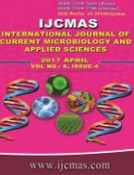


 National Academy of Agricultural Sciences (NAAS)
National Academy of Agricultural Sciences (NAAS)

|
PRINT ISSN : 2319-7692
Online ISSN : 2319-7706 Issues : 12 per year Publisher : Excellent Publishers Email : editorijcmas@gmail.com / submit@ijcmas.com Editor-in-chief: Dr.M.Prakash Index Copernicus ICV 2018: 95.39 NAAS RATING 2020: 5.38 |
Arbuscular mycorrhizal fungi (AMF) form obligate symbiotic association with the roots of crop plants and play a critical role in enhancing plant growth under semi-arid climatic conditions. Present investigation has been taken up to characterize the isolated AM fungal species from rhizosphere soils of different host crops grown across various Zones of Andhra Pradesh. A total of twelve AM fungal spores were characterized based on their morphological traits. The Genus Glomus has been found to be most predominant in the soils of Andhra Pradesh and contributed to an extent of 75% of the total AM fungal genera studied in the present work. Growth of Maize crop was evaluated after inoculating 12 different AM Fungal isolates collected from five different agroclimatic Zones of Andhra Pradesh. These mycorrhizal isolates were tested for their ability to increase the plant growth. Among the twelve isolates root colonization was maximum where we inoculated with whereas AMF-C3 (78.8%). Spore density was maximum in the rhizosphere soil of AMF-B3 (40.0/100g of soil) and plant height. Response of AMF isolates inoculation to maize plants with highest fresh biomass was recorded in the plants inoculated with AMF-C3 (162.6g/plant), followed by AMF-B1 (139.4 g/plant) AMF-S2 (136.8g/plant). Similar trend was recorded with respect to plant dry mass in response to AMF isolates inoculation, where highest plant dry biomass was recorded in AMF-C3 (83.0 g/plant) and least in case of AMF-P2 (100.3 g/plant). Plants inoculated with AMF-C3 resulted in significant increase in per cent AMF root colonization, spore density, plant height and dry mass compared to the other AMF isolates.
 |
 |
 |
 |
 |